
What your skin says about your health
The skin is your body’s largest organ so changes in your hair, skin or nails can be a sign that something is going on beneath the surface. While problematic skin could simply mean that you need to alter your beauty routine, your skin’s condition could also be the tell-tale sign of an underlying medical condition, says Dr. Jillian Macdonald, a dermatologist with The Ottawa Clinic and an associate professor in dermatology at the University of Ottawa.
Read on to find out what your skin says about your health.
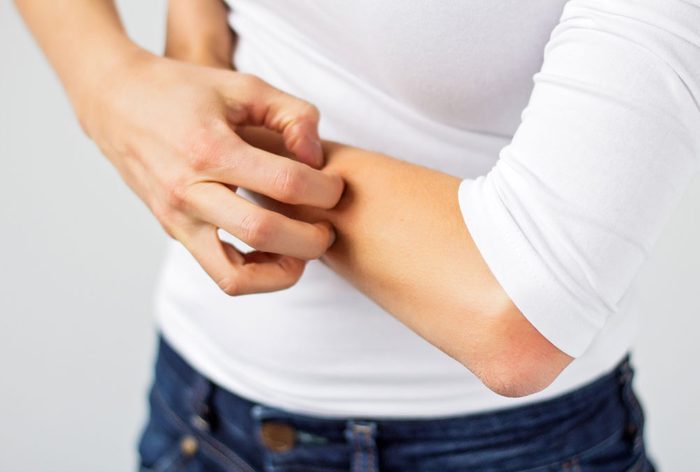
Dry, itchy skin
If your moisturizer just isn’t cutting it, it’s time to look deeper. “Chronically dry skin is commonly caused by two things: eczema and general dryness or climate,” says Dr. Macdonald. Eczema, a chronic inflammatory skin condition, can cause dry, itchy, inflamed and cracked skin. It has immunological, genetic and environmental components and is also related to asthma and hay fever.
(Related: Learn how to tell eczema from other skin issues.)
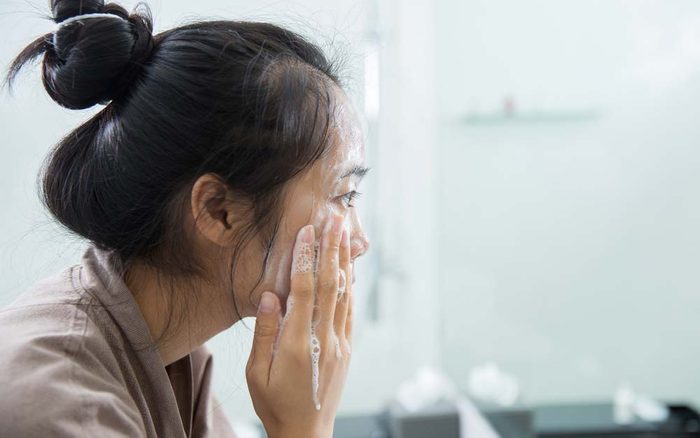
Chin and jawline breakouts
Pimples popping up along your jawline and chin again? Breakouts in these areas could signal a possible hormone imbalance. This kind of adult acne is very common in women who may not have had acne as teenagers, explains Dr. Macdonald. But don’t worry or you could exacerbate the problem. Keep in mind that hormonal acne in women can get worse in times of stress, during your period or during menopause.
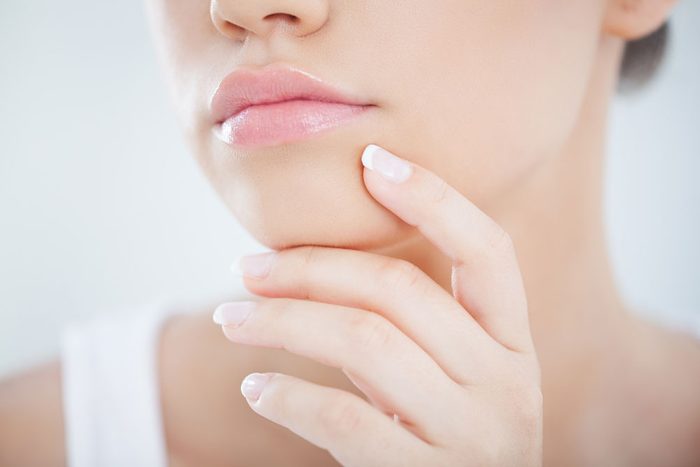
Unusual hair growth
Unwanted hair that’s sprouting up in classic male areas, such as around the chin or just below your bellybutton, could be a sign of polycystic ovarian syndrome (PCOS), says Dr. Macdonald. But, genetics and hormones also play a role in hair growth. If you’re concerned or exhibiting other symptoms of PCOS (such as an inability to lose weight despite diet and exercise or irregular periods), consult a doctor to rule out PCOS.
(Related: Here’s how your diet can help manage your PCOS symptoms.)
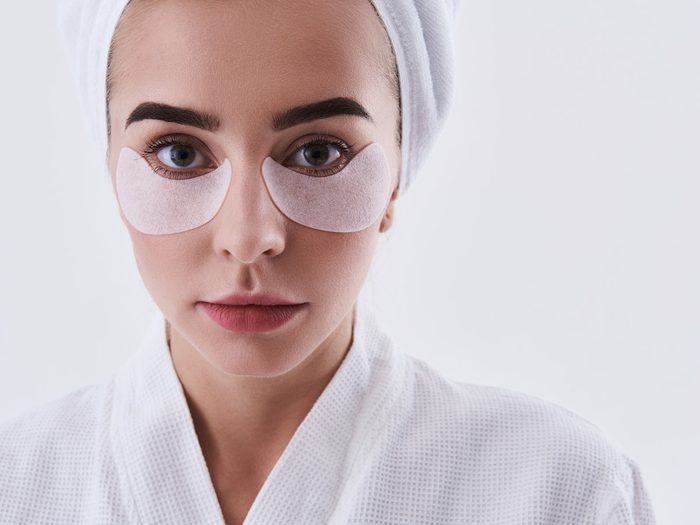
Dark circles
Before you slap on concealer, consider all the factors that could be causing your circles. Dark undereyes can be a combination of genetics, age or lifestyle factors. Anatomically as you age, the fat pads and structural support around your eyes changes so you can see more of the hollows, says Dr. Macdonald. Dark skin under your eyes can also be caused by a nutrient deficiency, a lack of hydration or not getting enough sleep.
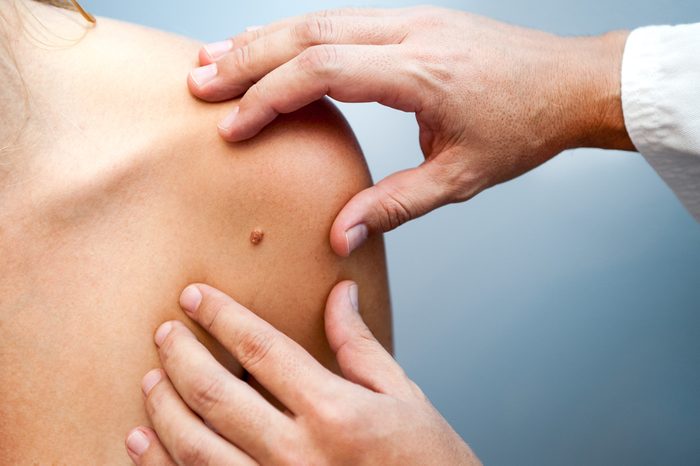
Sun spots
Freckles and dark spots are “a measure of your lifelong sun damage,” says Dr. Macdonald. Most sun damage occurs during childhood and teen years and can increase your risk for skin cancer. Keep an eye on any changes in your skin from moles to raised lesions or sores that won’t heal.
(Related: This is what skin cancer looks like.)

Excess fine white hairs
Everyone knows skin cancer shows up on the epidermis. But sometimes internal cancers such as gastrointestinal (GI), lung or ovarian, can have skin symptoms, too. A condition called acquired hypertrichosis lanuginosa is when people develop excess fine white hairs, usually on their face, that’s known as a “malignant down” and is an ominous sign of internal malignancy most commonly associated with lung and colon cancers.
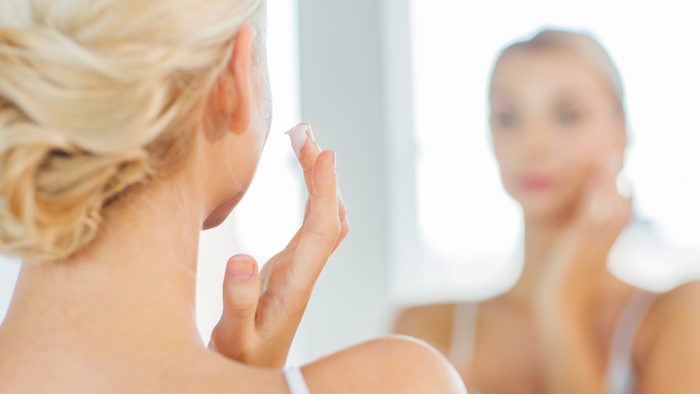
Sallow complexion
Dehydration can cause your skin to lack lustre and your face can become shallow looking, explains Dr. Macdonald. Dry winter weather can also play a role in a sallow complexion. Drinking enough water and getting ample sleep can improve the look of your skin.

Red bumps
Don’t assume all red bumps are pimples. A ruddy complexion, redness and dry skin can all be symptoms of rosacea. This chronic skin condition is caused by both environmental and genetic factors, and is often triggered by the weather, spicy foods, exercise, and stress.
(Related: Consider these recommendations to help better manage this skin condition.)
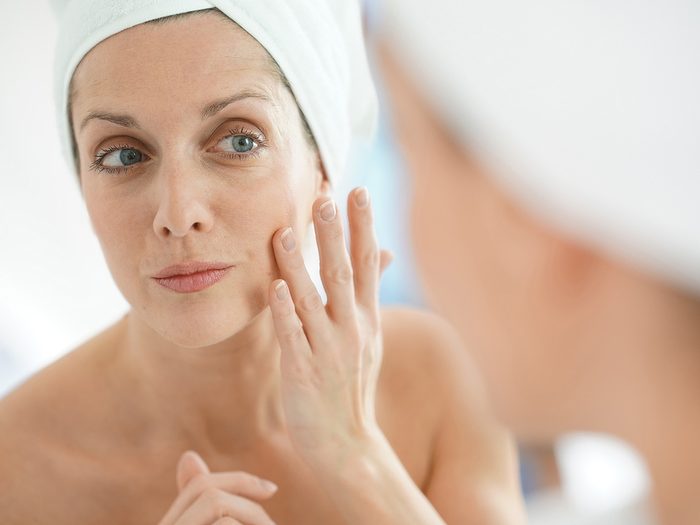
Unexplained tanning or darkening of the skin
An unexplained tanning or darkening of the skin—for example, it’s winter in Canada but you’re bronzing up nicely—is the telltale skin sign for Addison’s. The darkening can also be seen in the mouth (gums) or inner ear. “In an underactive adrenal gland they are not producing the stress hormone called cortisol. As a result, the brain overproduces (from the pituitary gland) a hormone called ACTH that increases skin pigmentation,” says Dr. David Lau, an endocrinologist and professor of medicine, biochemistry and molecular biology at the University of Calgary Cumming School of Medicine.
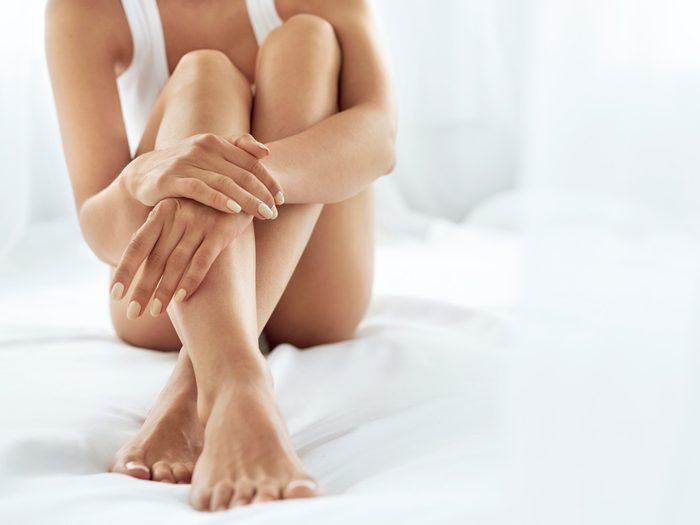
An increase in sweating
Warm skin, increased sweating, redness of the palms or facial flushing, along with thinning hair or hair loss and spooning or concavity of the nails, are all outward signs of an overactive thyroid. A person might also develop what’s called a “thyroid stare” because the eyelids pull back and the eyes seem to bulge. “For women especially, the hair loss can tip them off. They start losing hair from the scalp without understanding what’s going on,” says Dr. Lau.
(Related: Here’s what doctors want you to know about thyroid problems.)
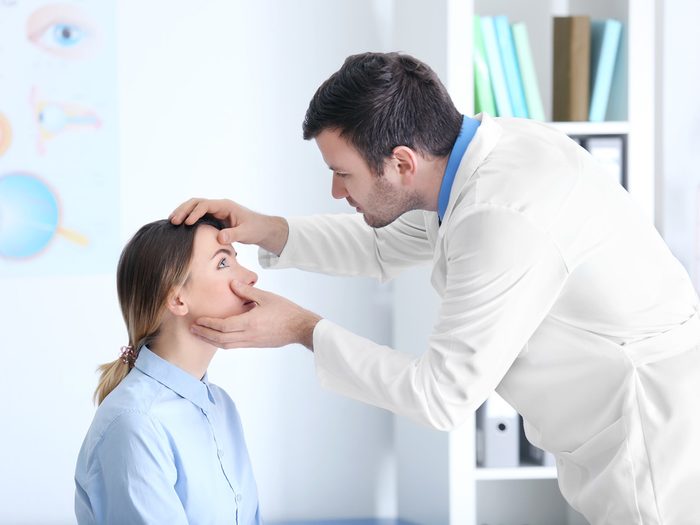
Puffy, irritated eyelids
Allergies could be the culprit for swollen eyes. If the irritation is accompanied by a rash, you could be suffering from eczema (a common symptom in adults is dryness and rashes on the eyelids) or contact dermatitis caused by an irritating product. “I see a lot of eyelid dermatitis,” says Dr. McDonald. “People have to look at all the products they are using from sponge applicators to makeup.”
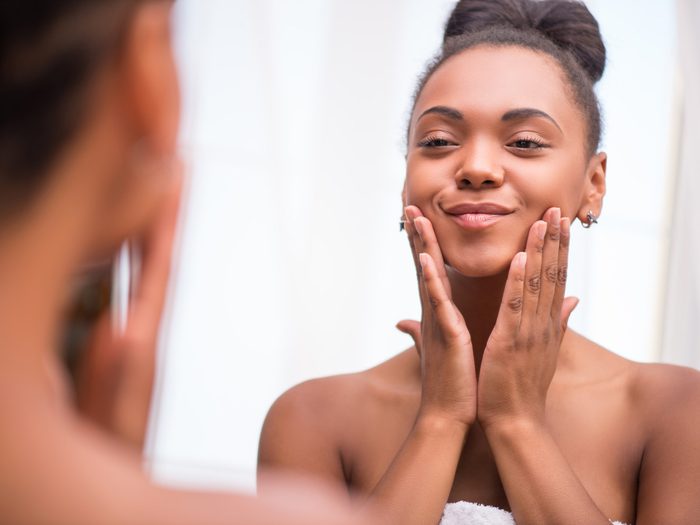
Constant flushing
Feeling embarrassed about your flushing? A chronically red forehead and cheeks could be caused by dilated blood vessels due to the chronic skin condition rosacea, says Dr. Macdonald. Extreme flushing can also be caused by hormonal changes in women such as menopause.
(Related: Here are the questions about menopause you’ve been too scared to ask.)
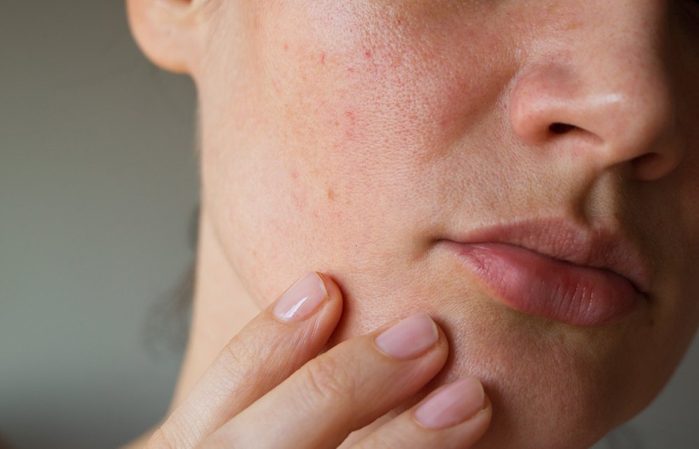
Visible veins
Unsightly veins aren’t merely cosmetic. “Your veins are an important indicator of your circulatory health,” says Dr. Macdonald. Spider veins or varicose veins on your legs can be a signal of deeper issues with your blood flow caused by age, weight and genetics; however, spider veins on your face can be caused by excessive straining or rosacea.
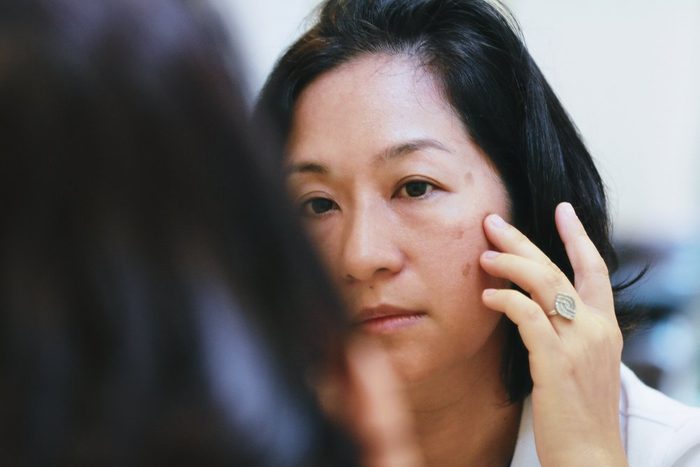
Dark patches
Dark pigmentation on the face (known as melasma) tends to be hormonally related in women, and is often associated with pregnancy. While it doesn’t signal an underlying medical issue it can be triggered by hormonal spikes and exacerbated by the sun.
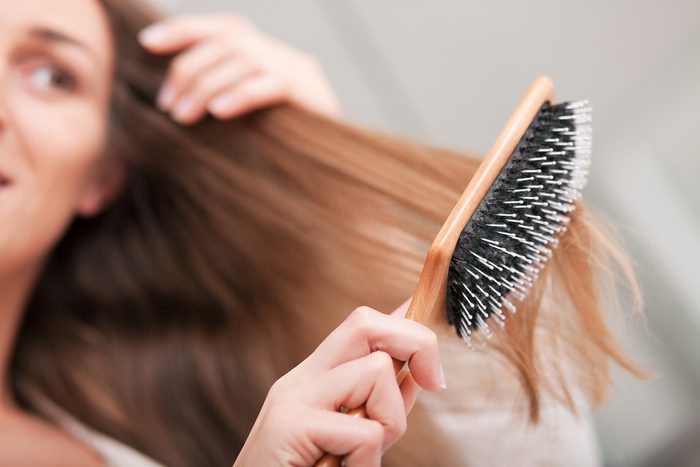
Thinning hair
“The number one cause of hair loss is female and male pattern baldness,” says Dr. Macdonald. This hair loss is generally both hormonal and genetic. In men, thinning typical begins at the hairline, while in women it can start as thinning that begins on the top of the head or centre of the scalp.
(Related: Here’s the root cause of thinning hair.)
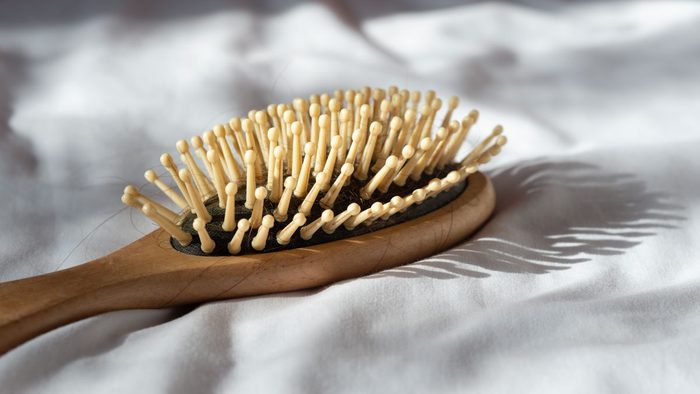
Hair loss
If you’re suffering from distinct, round patches of hair loss both on your head and body this can signal something called alopecia areata. This autoimmune disease often has a genetic component and can occur in otherwise healthy individuals. Dramatic and sudden hair loss, called telogen effluvium, is commonly caused by things like childbirth, severe psychological stress, high fever, infection or a major illness, but will generally grow back in three months time.
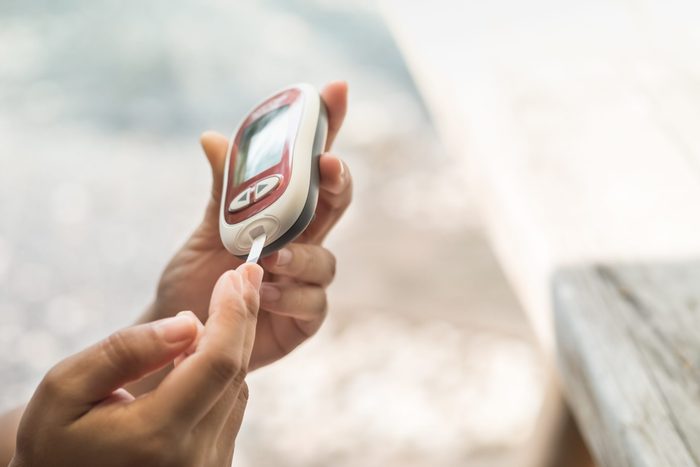
Yellowish nodules
“There are at least 10 or 15 skin signs or changes that you can see in diabetes,” says Dr. Lynne Robertson, a dermatologist and clinical associate professor in the Department of Medicine, Division of Dermatology, at the University of Calgary. The most common include xanthomas, which are yellowish nodules that are fat deposits; acanthosis nigricans, the dark, thick, velvety plaques that appear on the nape of the neck or in the armpits or groin area; and diabetic dermopathy, where the legs develop spots of hyper-pigmentation from poor circulation due to high blood sugar. Additionally, uncontrolled or poorly managed diabetes can lead to a range of serious secondary skin conditions, from infections and ulcerating lesions to neuropathy, which is the loss of feeling in the fingers or toes from poor circulation.
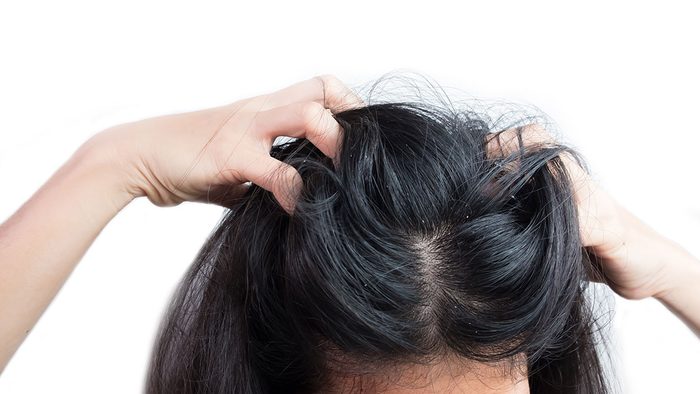
Flaky scalp
An itchy, flaky scalp can be caused by seborrheic dermatitis, a common scalp condition that results in stubborn dandruff, scaly patches and red skin. If your scalp is extremely flaky and irritated, you could be suffering from psoriasis. Psoriasis, a chronic inflammatory skin condition, can have internal associations such as psoriatic arthritis or an increased risk of heart disease so it’s important to consult a doctor about this condition, says Dr. Macdonald.
(Related: Learn how to relieve psoriasis symptoms.)
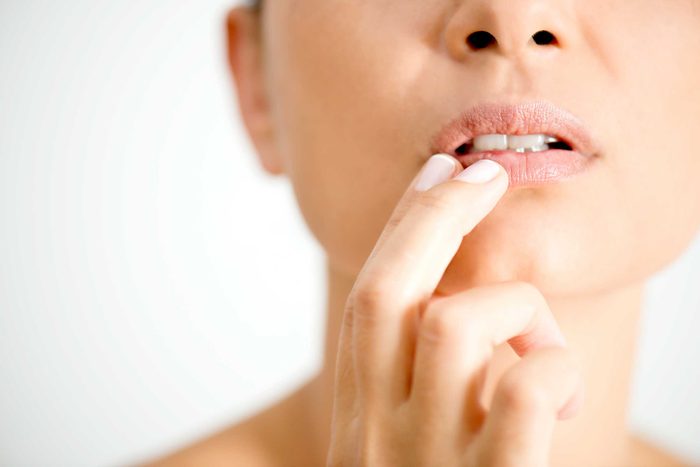
Dry, cracked lips
While the most common cause of dry lips is the weather and frequent lip-licking, you could also be developing an allergy to a lipstick or toothpaste you’re using, says Dr. Macdonald. If you have specific redness, scaling or fissuring at the corners of your mouth, you could have perlèche, an easily treated fungal infection that is sometimes associated with a vitamin deficiency or a chronic illness.
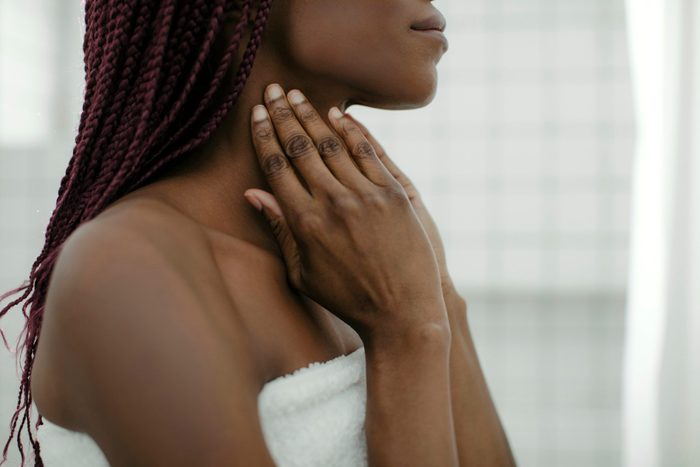
Purple butterfly rash
The classic skin symptom for lupus is a butterfly rash on the cheeks and bridge of the nose. There might also be a history of sun sensitivity, mouth ulcers or other skin rashes. “A facial rash is usually not lupus, but if the rash is purple and near the hairline, and you’ve got little patches of hair loss that your hairdresser notices, then you should talk to your family doctor about doing a blood test for lupus,” says Dr. Kam Shojania, clinical professor and head of the Division of Rheumatology at the University of British Columbia. Other signs are if your fingers are changing colour in the cold and the small joints of your hands and feet are getting painful, says Dr. Shojania.
Lupus is an autoimmune disease affects one in 1,000 people, more commonly women. It causes inflammation in tissues or organs, such as the skin, muscles, joints, kidneys, lungs, and heart. Its nickname is “the disease with 1,000 faces” because it presents differently in each case, making it difficult to diagnose.
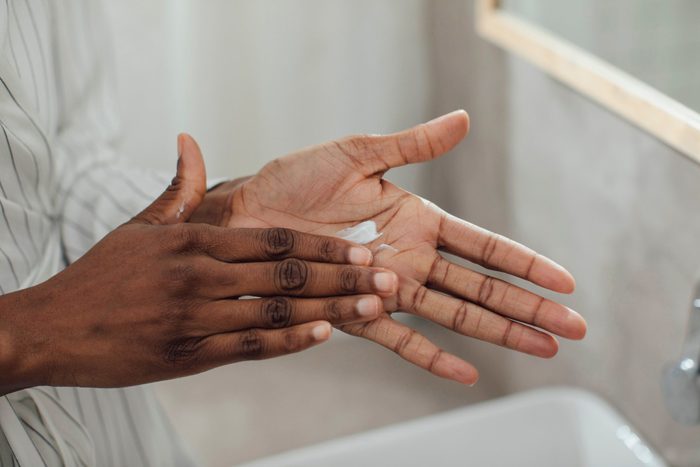
Nail changes
“Nails are a gateway to your health,” says Dr. Macdonald. If you develop discoloration, dark spots, changes in your nail shape or clubbing, these can be signs of internal issues below the surface from vitamin deficiencies and lupus to liver disease.
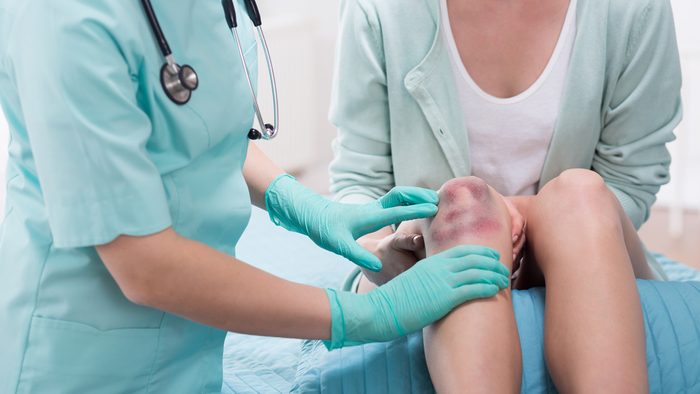
Bruising
Frequent unexplained bruising or bruises that don’t heal could signal a bleeding disorder. But, your body also bruises more easily with age because the capillaries are closer to the surface as your skin thins. Medications like blood thinners can also contribute to bruises. (Related: Learn the biggest factor that causes your body to deteriorate as you age.)
If you have large, unexplained bruising or new bruises after starting a medication, speak to a doctor.
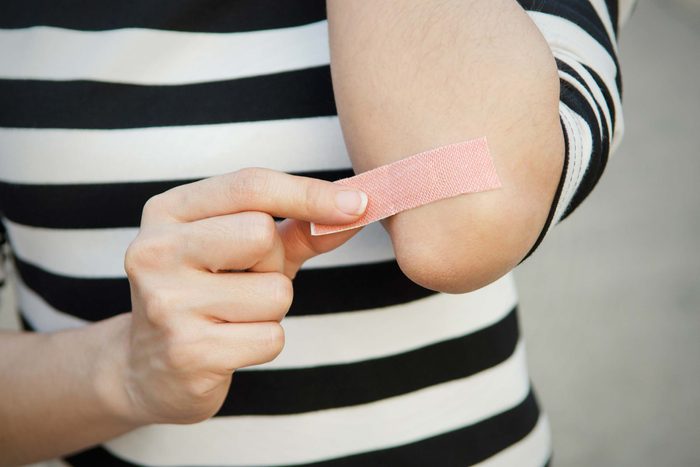
Cuts that won’t heal
If a cut or wound is slow to heal, it could signal a possible skin infection. Other causes of slow wound healing include skin cancer (basal or squamous cell carcinoma), a blood clotting disorder, or diabetes.

Yellowing skin
Yellowing of the skin and the whites of the eyes, known as jaundice, is the classic skin symptom for Hepatitis. Patients may also experience severe itching. Hepatitis C can also cause scaly skin rashes or necrotic ulcers caused by a kind of anemia that develops as a reaction to the virus. “People should ask for screening for Hepatitis B and C and have their liver biochemistry checked. The public has to be proactive in what they ask their doctors to do,’” says Dr. Eric Yoshida, a gastroenterologist and Chairman of the Canadian Liver Foundation Medical Advisory Committee. It’s crucial to catch Hepatitis B and C early, as many people won’t have any symptoms until the liver becomes cirrhotic.
